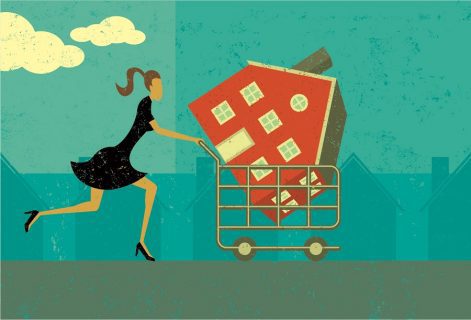Renting vs. Buying a House: Which is Right for You?

Buying a home is kind of a huge deal, and as a group, millennials are taking that step a little later than previous generations. (Millennials are also moving out later, getting married later, and having kids later, so buying a home later is no great surprise.) Even though our generation is delaying home ownership, we’re actually more committed to the goal of homeownership than any other generation. That means even if you’re not house-shopping right now, homeownership is likely something that’s crossed your mind.
But how do you know when you’re ready to quit renting and buy a home? Let’s get the obvious out of the way: Buying a home is expensive. But unless you’re living the sweet freeloading-off-your-parents-life, renting isn’t free either. The answer isn’t going to be the same for everyone, and no one can make the decision for you (not even me, with all of my research and calculator apps!), but there are some questions that can help you evaluate the pros and cons of renting vs buying a house.
1. Is Your Rent More Than a Mortgage on an Equivalent Property?
In some areas, rental properties are expensive. In others, the housing market is inflated. There’s no one-size-fits-all answer, but analyzing the respective markets is a good place to start.
For example, let’s compare the average monthly housing costs of Arkansas and Colorado. In Arkansas, the average monthly rent is $1,050 but the average monthly mortgage is only $769. For most people, that means that buying is the cheaper option in the long term. In Colorado, however, the average monthly rent is $1,700 and the average monthly mortgage is $1,837, which makes renting cheaper than buying.
These are state averages, and housing costs can vary widely even within your state. Realtor.com’s Rent or Buy Calculator takes it down to the zip code level.
2. Can You Make a Down Payment of 20%?
If not, your monthly mortgage will be way more expensive. Ralph McLaughlin, chief economist at Trulia, explained the increased cost to Learn Vest:
“[Not putting 20% down] generally means you’ll be charged a higher interest rate. You’ll also likely have to pay mortgage insurance, a monthly fee that ranges from about $50 to $500 and goes directly to an insurance company protecting the bank’s interest—not yours.”
Basically, a healthy down payment helps you financially, but it also can demonstrate that you have the resources and discipline to save a substantial amount of money to both you and your mortgage lender.
3. Where Will You be in Five to Ten Years?
Renting offers mobility; buying offers stability. If you’re ready to settle down or at least stay put for five years, you are in a position to consider buying. If you’re contemplating a move anytime soon, renting is likely the better option.
Why is five years the minimum? Although it varies from market to market, five years is generally accepted to be the shortest length of time you can live in a home before selling without losing money due to a combo of paying closing costs and the way loans work. Five is just a rule of thumb, but The New York Times factors the number of years you plan to stay in the home into their Renting vs Buying calculator if you want a more accurate estimate.
4. How’s Your Credit Score?
Your credit score isn’t a deal breaker, but a good credit score makes it much easier to buy a home. Although you should always be keeping tabs on your credit score, when you’re considering home ownership, paying attention to your credit score is a must.
If your credit is in a good place, take steps to keep it that way. If you know that your credit score isn’t great, then start working on it now. Many millennials start to contemplate home ownership as early as two years before they’re ready to buy. In two years, you’d be amazed what you can do for your credit score.
5. Are You Ready for the Responsibilities of Homeownership?
When considering home ownership, many people make the mistake of treating a monthly mortgage like it’s rent: a flat fee you pay every month for the ability to live there. In reality, home ownership comes with the cost of home maintenance and repairs, homeowners insurance, property taxes, and more.
Some of the costs take the form of regular, consistent bills, like your homeowners’ insurance, but some are not. For example, a new roof will set you back quite a bit more than a new garbage disposal, and while you may be able to estimate when you’ll need to replace your roof, one bad storm is all it takes.
It’s not all doom and gloom, though. If you have bought a home that you can comfortably afford, you can start building up an emergency fund for your house. And, if you have good credit, like we mentioned earlier, you can likely qualify for a low-interest loan to finance any large, emergency repairs.
6. Can You Fix Things Yourself?
When you rent, it doesn’t really matter whether you can fix things around the house. If your garbage disposal breaks, you can just call your landlord and it’s their job to get it repaired and working again.
When you buy a home, you won’t have a landlord to come fix things for you; you’ll have to fix it. That said, you don’t have to be the handiest (wo)man on the block to own a home; you can pay someone to come fix things for you, but learning how to handle a simple repair or two will save you from calling a plumber for a tiny toilet leak.
7. Is Renting Keeping You From Doing Something You Want?
Finally, let’s not pretend that the decision to buy a home is wholly based on numbers and logic – there’s an emotional component. If renting is keeping you from doing something that you really want to do, that’s going to factor into your decision.
Are you someone who really loves personalizing their home? Do you want a dog, but you live somewhere that doesn’t allow pets? These aren’t hard and fast financial questions, but they’re nonetheless important to your decision.
Basically, what I’m trying to say is: You need to crunch the numbers, but ultimately, the numbers can’t make the decision for you. Ultimately, it comes down to deciding what fits your lifestyle: renting or buying, and then living accordingly.
Follow Meleah on Twitter: @meleahbowles
Last modified on February 15th, 2019
Editor (and occasional writer) on a mission to turn intimidating finance subjects into interesting, easy-to-read content. She’s an avid TV consumer and a huge fan of dogs (especially hers).










Show Comments +